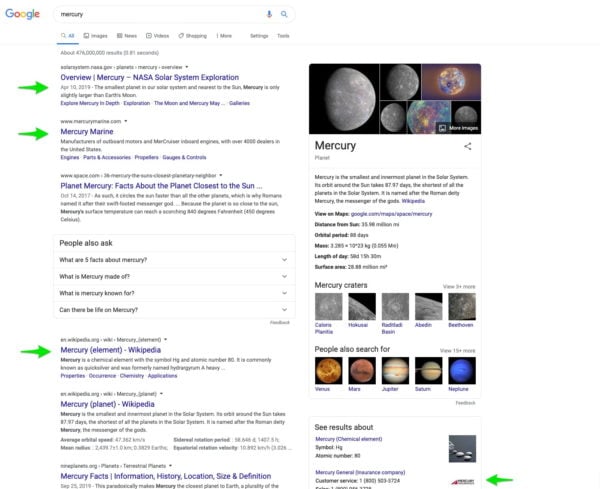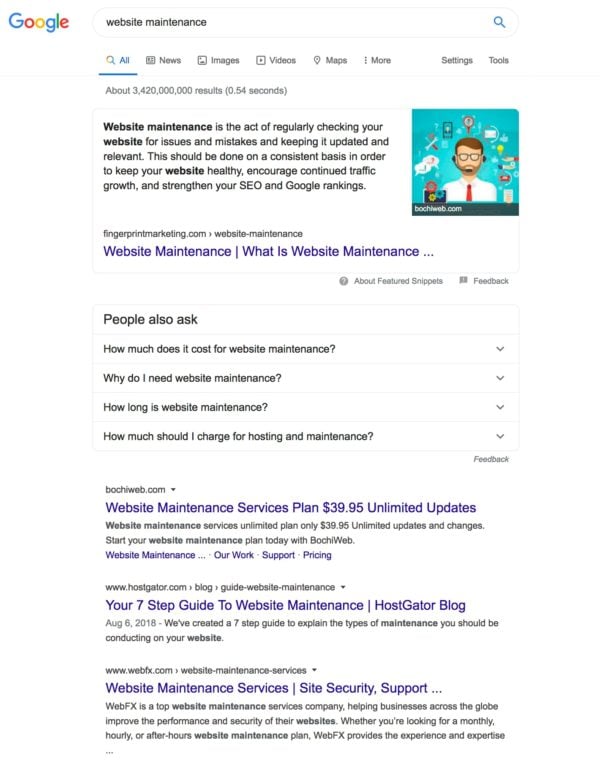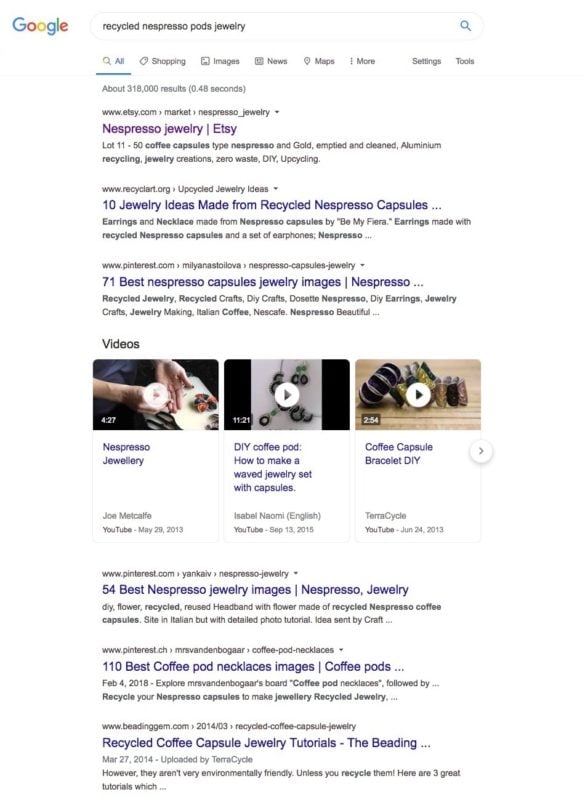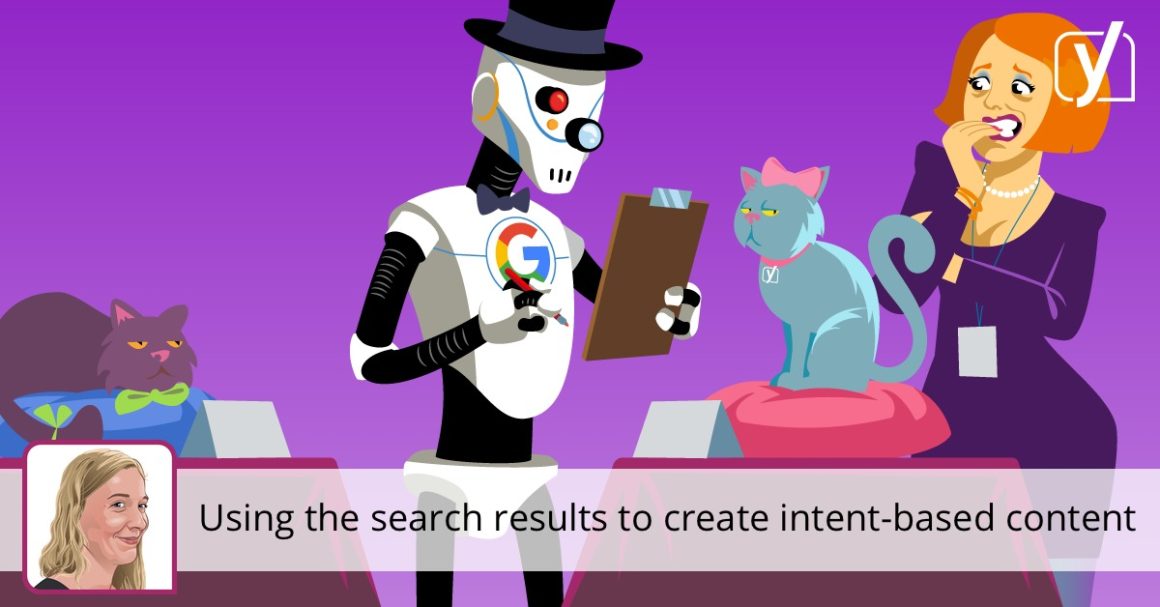After getting her Master’s in Art & Visual Culture, Melina worked in the cultural sector, editing and writing all kinds of texts. She enjoys applying her writing skills and eye for detail in the blog team at Yoast.
Search intent is becoming more and more important. Google is getting better and better at guessing exactly what searchers are looking for when they type in their – sometimes cryptic – search terms. That’s why you need to focus on it as well! What is search intent, again? How do search engines approach user intent? And how can you assess if you target the right type of intent with your content? This post is all about that!
Search intent?
Let’s start with a quick refresher on the term ‘search intent’. You’ll recognize from your own online behavior that each search term is entered with a particular intent in mind. Sometimes, you want to find information. Other times, you’re looking to research or buy a certain product. And don’t forget all those times you enter a brand name because you don’t want to type out the site’s entire URL. We generally distinguish four types of searcher intent: informational, commercial, transactional and navigational. If this is new to you, head over to our SEO basics article on search intent, that’ll make understanding this post a bit easier.
Search engines try to predict user intent
Of course, for each of these four categories of user intent, there can still be a lot of variation in what exactly a user is looking for. Search engines use data to interpret what the dominant intent of a query is. They want to present results that match user intent exactly. Before we can use the search results to create our intent based content, we need to understand how search intent works for different queries.
Search terms with dominant intent
Sometimes, a search term has one dominant interpretation. Those terms can be very straightforward, like [buy King Louie Betty dress] or [symptoms of diabetes]. For the first term, results will mainly show pages offering that particular model of dress for sale, or similar dresses by that brand. For the second, results are filled with answer boxes and websites offering medical information.
Google also understands the intent behind terms that aren’t as literal. For example, whenever people all over the world enter [white house] as a search term, they’re not looking for information on painting their house white. They want to know something about the residence of the president of the United States, and search engines show results accordingly.
Search terms referring to several entities
In many cases, the same term can be used to look for very different things. Let’s take the search term [Mercury]. Some people will be looking for the planet, others for the element, even others for the Roman god of commerce, and a few might actually be looking for the lead singer of the band Queen. The reason for that is that this one word can be used to describe several distinctly different things – also described as entities. The context makes clear which entity a word is referring to. It’s important to be aware of how this works in search engines, so read up on the topic in Edwin’s post about entities and semantics.
All these searches probably have informational intent, but they’re not looking for the same thing. While it’s difficult – especially from one word, like in this example – search engines still try to figure out what their users really want when typing in their search term. So, if, for example, less people click to the ‘mercury-element’ results, than to the ‘mercury-planet’ results, they’ll deduce that more people want information about the planet Mercury, and alter the results pages accordingly. If we take a look at the search results for the term [Mercury], we’ll indeed see that most results relate to the planet. From that, we can conclude from that it’s the dominant intent: most people who type in this term are looking for the planet.
 Google tries to satisfy multiple intents for the search term [mercury]
Google tries to satisfy multiple intents for the search term [mercury]Search terms without dominant intent
Some search terms don’t have one clear-cut intent, which leaves search engines guessing at what to show. You can recognize these searches when the results pages show many different results. Take the query [tree house], for example. Depending on your exact location, the search results show images of tree houses, information and videos on how to build one, advertisements for buying one, and businesses called ‘Tree house’, including a brewery, restaurants, holiday homes, and a code learning web platform. This variety means that Google has most types of intent behind this query covered. But it may make ranking more difficult.
Why should you use the search results to create intent-based content?
Simply put: because the search results give direct insight into what people are looking for when they’re typing in your keywords. You can easily lose sight of the SERPs (Search Engine Results Pages) as your most direct source of information. But if you focus on your site alone, or only look at things through the eyes of tools, you miss invaluable information about what your audience is looking for. Search results pages not only show you how you and your competitors are doing, but also where new opportunities are and whether you need to adjust your SEO strategy. For instance, if you see a lot of images in the results pages for your keyphrase, and you don’t have any, that’s an opportunity!
To get the most objective idea of the search results for a query, make sure you use a private browser window. A local SERP-checker, such as https://valentin.app/ can also help you get even more objective results, and find out what the results look like in other cities.
Creating intent-based content yourself
There are a few steps you can take to attune your content better to user search intent and work towards creating intent-based content.
- Choose keywords from your keyword research and enter them in a private browser window or SERP-checker.
- Analyze what you see on the results pages. Which type of intent is most common? (informational, commercial, etc?) Is there one dominant interpretation and if so, what is it? Do you see videos? Images? Related searches?
- Evaluate whether the content you have – or plan to publish – is in line with the things you found on the results pages. Do the types of intent match? Is your content in the right form?
- If yes, great! Perhaps you can find ranking ideas in related searches. And, have a quick peek at the competition, to see what you’re up against.
- Do you notice that things don’t match up, and the SERPs show intent that doesn’t align with what you offer in your content? Depending on what you find in the SERPs, you might still be able to rank. For example, perhaps there isn’t a dominant type of intent, in which case your content could still make the cut. However, if you find intent that unanimously doesn’t match what you have to offer at all, ranking will be difficult, unless you’re having a high authority site. In that case, consider whether it’s worth the effort to create your content, or if you need to adjust your strategy a little. A solution could be to target a slightly different related keyword, with better matching user intent, or to adjust your content.
This all still sounds a bit abstract. So, let’s look at a few examples to give you a better idea of this process in practice!
Examples of research to create intent-based content
Using the right terminology in informational content
 Results page for the search term [website maintenance]
Results page for the search term [website maintenance]Here at Yoast, we write about all aspects of SEO. One of those aspects is keeping your website in good shape. We had an article planned on this topic, and one of the most important terms we used in this article was ‘Website maintenance’. Our article was about keeping your site content fresh and your site’s structure well-maintained in the process. However, when we started looking at the SERPs, we noticed that wasn’t what people were looking for at all when they used that term. The content in the answer box wasn’t really related, and the other results almost exclusively consisted of companies offering services to work on technical site maintenance and hosting, with some results stressing the importance of this.
So, from analyzing the SERPs, we got two important insights. Firstly, many people using the search term [website maintenance] have commercial intent, rather than informational. Secondly, they were actually looking for something completely different. So, while we could write an article about website maintenance, to rank, it needed to be a completely different article. It should discuss things like hosting, technical site performance, etc, as that’s what searchers are looking for.
We realized we had to make changes to the article, adapt our strategy and target a keyword with better matching intent. We changed some of the wording in this article (and related ones as well) from ‘maintenance’ to ‘keep old content’, ‘update or delete’ and ‘cannibalization’. Of course, you could argue that we didn’t pick the right words here in the first place. The reason for that might’ve been that we got a bit stuck in our own content bubble, and forgot about the user. Looking at the SERPs helped change perspective in this case.
Business case: selling recycled jewelry
Let’s look at another example, one that small business owners might relate to. Say, you run an online shop that sells jewelry made with recycled materials. One of your product groups is jewelry made of recycled nespresso pods. So, you’re thinking of trying to rank for [recycled nespresso pods] with a product page or category page. Is that a good idea? Time to look at the search results pages!
Of course, it somewhat depends on location, but prominent on the results page for [recycled nespresso pods] are results about how the pods are recycled. A few are from Nespresso itself, and you could also find some of their videos on recycling. Other results cover the process of recycling and how consumers can get their pods recycled. There is nothing on using recycled pods as a crafting material. So, now you know that this phrase will be difficult to rank for, as it’s not what users are looking for.
 Results page for [recycled nespresso pods jewelry].
Results page for [recycled nespresso pods jewelry].What about [recycled nespresso pods jewelry], then? As can be expected, the results align a lot better with what you have to offer. However, most results are geared towards informational intent. While the top result is Etsy -which would be difficult to compete with- other results show lists of ideas and tutorials. This means, again, it would be hard to get your commercial or transactional product (category) pages on this list. However, you could still rank if you’d change your strategy, and wrote a tutorial on crafting a basic piece of nespresso jewelry. In such a tutorial, you could easily refer people to your products if they’re looking for more intricate pieces. It might even be worthwhile to make a video tutorial, as there are video results on the results pages.
Conclusion
This post covers a lot of different aspects of search intent in this post. It deals with which types there are, whether or not there is a dominant interpretation and looking at the SERPs to gauge a query’s intent. The exact steps to take will differ on a case to case basis. A good takeaway, in any case, is to always take a good look at the results pages for keyphrases you’re targeting. Analyze what you see, as it’s valuable, first-hand information. Be realistic and be prepared to put in the work if you find you need to change your strategy. We’ve said it time and again: SEO is a lot of work, and you need to work hard to be the best result – for the right query.
Read more: On-SERP SEO can help you battle zero-click results »
Keep reading the article at Yoast • SEO for everyone. The article was originally written by Melina Reintjens on 2020-03-12 09:02:34.
The article was hand-picked and curated for you by the Editorial Team of WP Archives.

